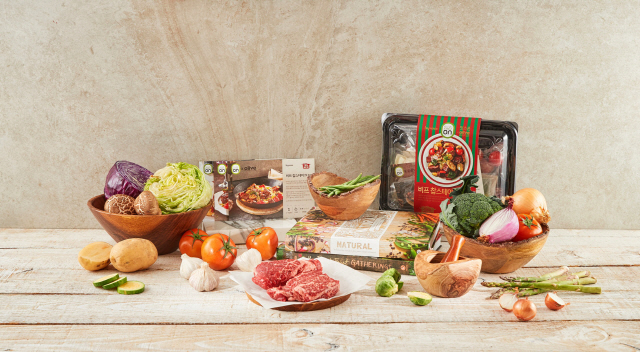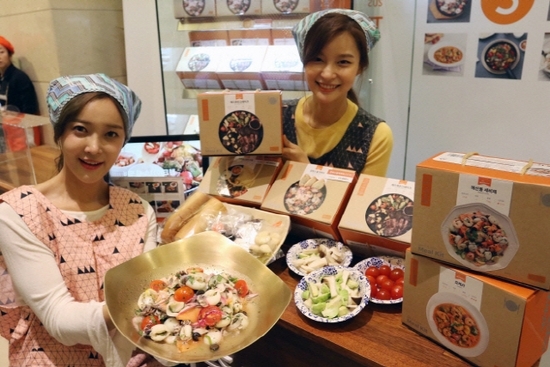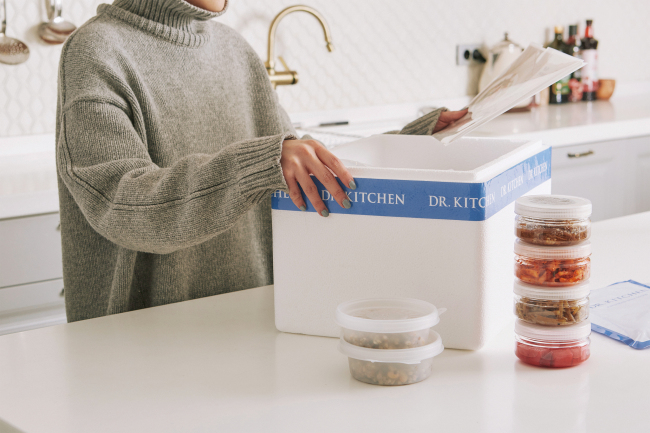[Feature] Popularity of meal kits change Koreans’ cooking at home
By Kim Da-solPublished : July 1, 2018 - 12:56
Office worker Kim Dong-bin has recently picked up the hobby of cooking, and his secret recipe is ready-to-cook meal kits.
“Meal kits made my cooking a lot easier, with fewer responsibilities,” said Kim. After work, he used to run to get groceries, prepare the ingredients, cook and do the dishes.
“For me, cooking was a time-consuming process even before sitting down to eat. But now, I cook restaurant-quality food at 30 percent less price in just about 20 minutes,” said Kim, adding that the kits have also lifted the burden of choosing what to have for dinner.
With a growing number of double-income couples as well as single households, the domestic meal kit market is expanding rapidly.
“Meal kits made my cooking a lot easier, with fewer responsibilities,” said Kim. After work, he used to run to get groceries, prepare the ingredients, cook and do the dishes.
“For me, cooking was a time-consuming process even before sitting down to eat. But now, I cook restaurant-quality food at 30 percent less price in just about 20 minutes,” said Kim, adding that the kits have also lifted the burden of choosing what to have for dinner.
With a growing number of double-income couples as well as single households, the domestic meal kit market is expanding rapidly.

With some 20 companies competing here, the ready-to-eat industry here was valued at 3 trillion won ($2.7 billion) as of last year. Industry experts see that figure as surpassing 4 trillion won by year-end.
Amid the market expansion, the meal kit trend is evolving into more diversified, high-quality products.
Also called cooking boxes or recipe boxes here, meal kits are involve a subscription service that sends customers fresh, preportioned food ingredients and recipes to cook, usually requiring about 30 minutes.
Unlike ready-to-eat home meal replacements, meal kit ingredients are delivered fresh and do not last long, which consumers find healthier.
Blue Apron in the US in 2012 first began its meal kit subscription and delivery service. Since then, at least 150 companies have launched similar services, including retail giants Whole Foods and Amazon.
In South Korea, food retailers are leading the market.
Korea Yakult, a household name in yogurt and fermented dairy products, launched meal kit brand EatsOn last year, leveraging its door-to-door sales model.
With some 20 restaurant-style meal kits currently available, from beef chop steak to chicken quesadilla and prime steak, the company said it will expand the variety of items so consumers can cook food from around the world at home.
Other mobile app-based food delivery service companies like Market Kurly, Baemin Fresh and Prep have launched meal kit delivery services by strengthening their menu lineups and high-quality meals.
“The popularity of meal kit products is only to grow, considering that the number of single-person households will increase, as well as consumer demand for healthier and fresh ingredients,” said Kim Dong-ju, marketing director at Korea Yakult.

With the expanding market, others have joined the competition.
In April, Hyundai Department Store signed on with star chef Lee Song-hee to launch Chef Box.
Using vegetables, meat, fish and sauces available from Hyundai Department Store, Lee designed recipe cards for each kit so consumers can easily cook her signature dishes at home.
“When you look at our meal kit menu, four out of 15 menu items are dishes that you could only try at a restaurant. What we aim to provide is to give consumers a perfectly prepared meal kit that can help people eat globally famous dishes even at home and, of course, enjoy cooking,” said Cheon Gyu-beom, a food business manager at Hyundai Department Store.

Meal kits are also popular among those with special dietary needs.
Doctor Kitchen, a healthy meal research company that focuses on creating meal kits for diabetic patients, has some 420 items available for delivery.
The product is priced 10 percent higher than a normal meal kit -- 8,000 won for one kit -- and the company says consumer demand is on a gradual rise, not only among patients, but those who want strict, healthy diet plans.
The company use healthy ingredients such as konjac instead of flour and oligosaccharide instead of brown sugar.
“We collaborated with many premium hotel chefs and nutritionists at hospital cafeterias to overcome the common misconception that diets for patients are not tasty,” said Choi Tai-hyoung, marketing director at Doctor Kitchen.
By Kim Da-sol (ddd@heraldcorp.com)










![[Hello India] Hyundai Motor vows to boost 'clean mobility' in India](http://res.heraldm.com/phpwas/restmb_idxmake.php?idx=644&simg=/content/image/2024/04/25/20240425050672_0.jpg&u=)









